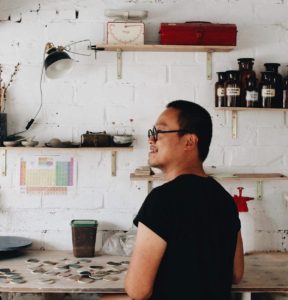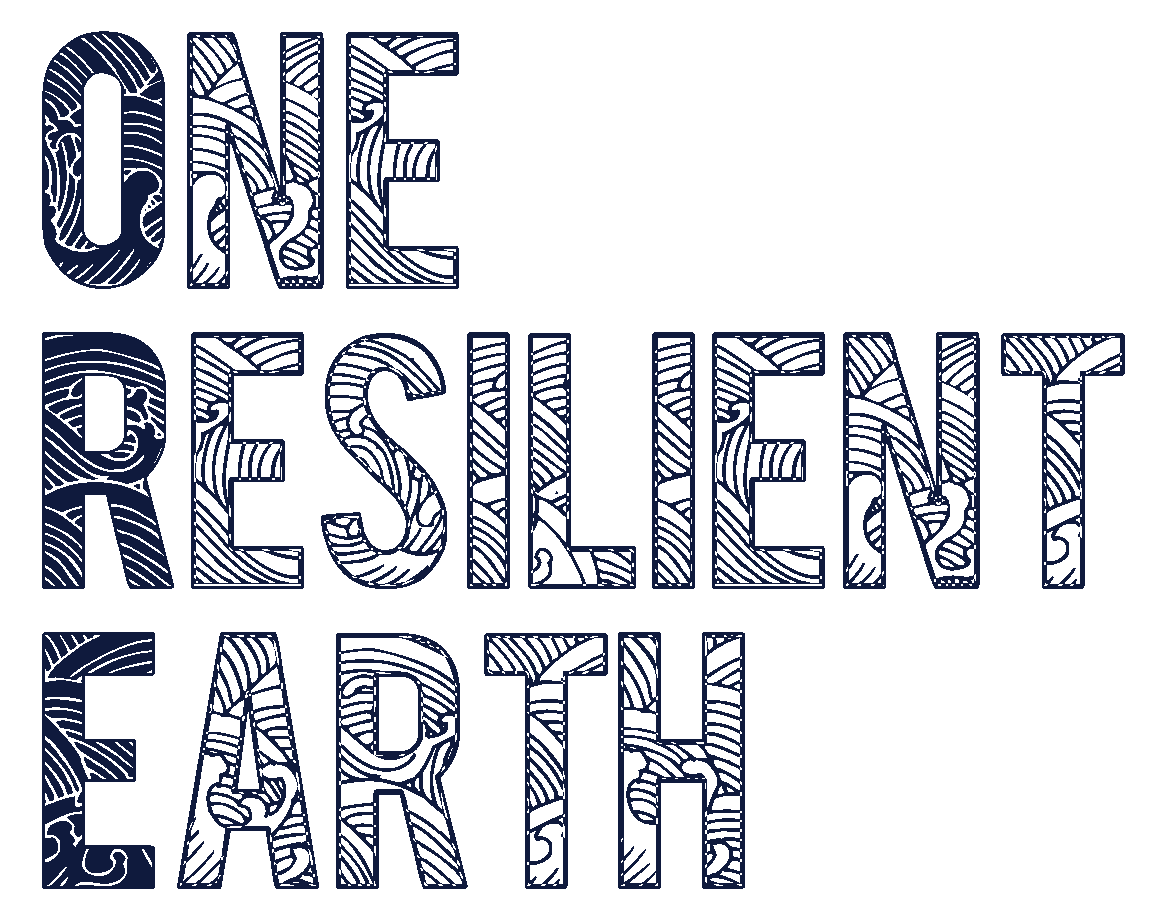A dialogue between Green Hsu, ex-opera singer, gardener and potter at Sheng Ceramic, and Anshul Mathur, One Resilient Earth, on growing delicious organic food from home without prior experience, and all the life transformations that come with it.
Anshul: In a few words tell me a bit about your background and current lifestyle.
Green: I have been studying classical music and opera singing most of my life. Back in Taiwan, my University Major was in Opera singing. I then decided to come to Brussels to study at the Conservatory. But after a few years I realized that so many talented artists struggle in life, so I went to business school. The initial idea was to bridge the arts and business worlds. Having been at both ends, I knew I would understand their respective languages and needs. I started to work with a lot of designers. I don’t do design but I appreciate their work and I did business strategy, planning, price setting and so on. I learnt a lot but after a few years in fashion, I decided to start a business of my own. Seven years ago was my first contact with pottery and I fell in love. Around four-five years ago I went to the academy in Antwerp to learn pottery and spent two years in school. Yet, I knew there was way more I could learn by practicing on a daily basis. I then moved to the countryside I got all the equipment I needed to experiment. It was fun and very enjoyable.
Anshul: How has food shaped these decisions? I’ve tasted your cooking and it is absolutely amazing. How did you decided to start growing your own sustainable garden?
Green: Everything came from curiosity. You can see that it is quite trendy now – chefs with great ideas have vegetable gardens, or are working with local farmers to grow their own herbs, fruits, vegetables. I was always curious about how the taste of fresh food would be compared to that of the food you get at the supermarket. And since I had rented a house with a 1000 square-meter garden, I thought: ‘Why not?’, ‘Why not just start it?’. So I cultivated the land inch by inch during the winter. When I moved into this house it was September and that winter I really cultivated the land and I removed the stones and the weeds. There were a lot of nettles. I removed them and started to form little piles of soil and started to plant.
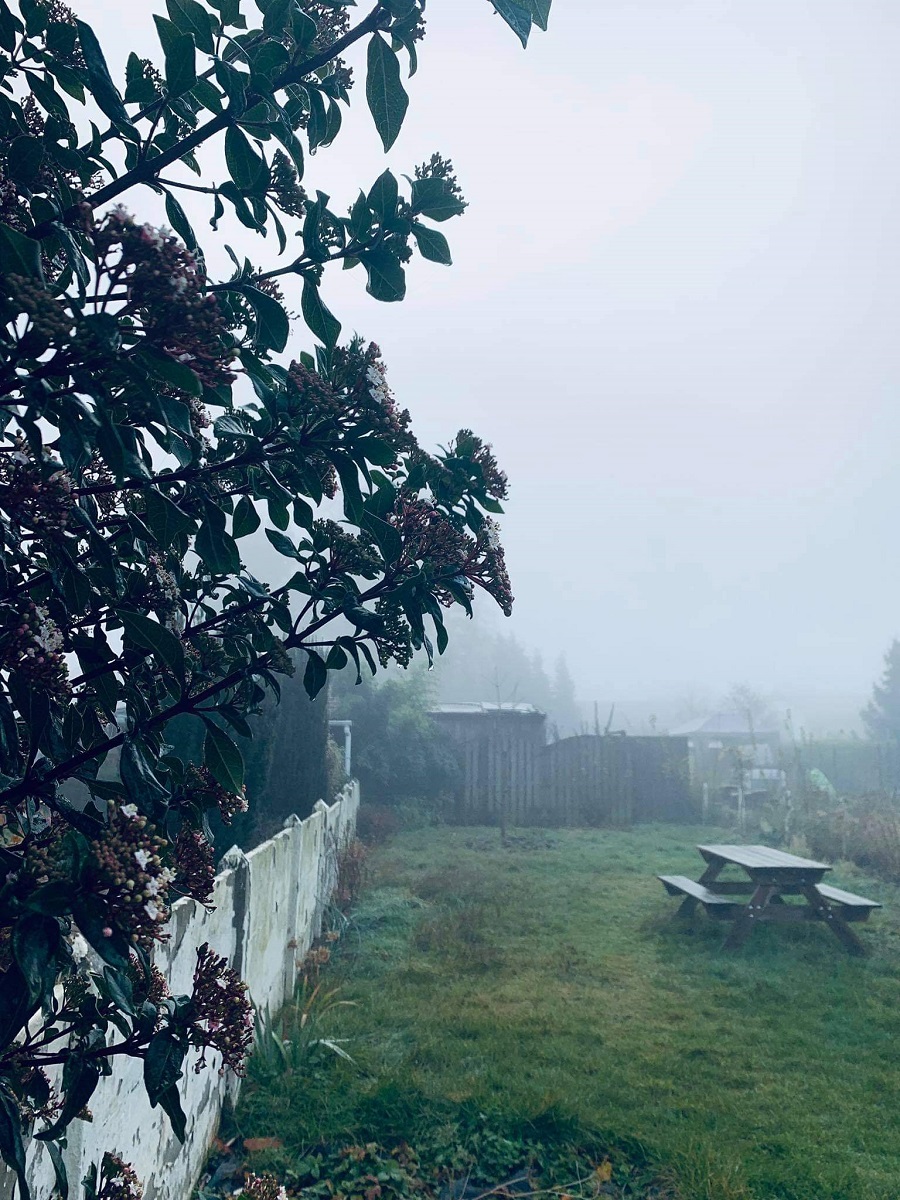
Anshul: Did you have to learn a lot because this sounds extremely daunting to someone like me who has lived in New York City for so long?
Green: I haven’t lived in giant cities but I was born and raised in cities, studied in cities, worked in cities. Yet becoming a farmer was always a childhood dream. Putting a seed in the soil and watching it grow, give flowers, reproduce… this is an amazing process to me so I was kind of happy to start. There was some fear of failure, of course. But how difficult could it be? Put seeds in soil and harvest. I soon started to understand and I really appreciated the process. I was doing, and learning by doing. I would go online and start to understand which family these vegetables belong to and what kind of environments they like. Do they like full sun, half shadow or do they need a lot of water? What kind of soil type? Every year, I would accumulate knowledge and in the end I just knew by heart.
Anshul: Did you have to do anything special in terms of equipment or other technical things? These are very naive questions from someone who has killed a lot of house plants.
Green: There are some tools that make the process easier but I think the process is the most important experience for me. So in the beginning, using only your hands you pull the weeds and dig the soil, and sometimes there was a piece of glass in the soil and I would cut myself. I started bleeding and thought ‘Oh my God, I am going to die!’ That all happens but that is the fun part of it. It is not only growing your own food and consuming the things you produce but there is also your story: there is your sweat and your blood in the soil and that is how you are bound to the land. Back in the old times when people were cultivating land and growing their own food, that is how it must have felt like, at a much large scale. Right now I am doing it in order to be self-sufficient and environmentally-friendly.
Anshul: On being environmentally friendly, did you have certain values or ideas on how you wanted your garden to be, such as organic for instance?
Green: When I started I knew that growing in the field does not compare to growing in a flower pot. Insect control in a field is almost impossible but I always try my best. Right before this interview, it was raining and every time I hear the rain I bring a box and run outside to pick the snails. A lot of people use chemicals to kill them and I have to say that every technique shared online like putting coffee grounds near the plants does not stop the snails. So the best way is to pick them up and feed them to my chickens. So no chemicals are used in my garden and I try to also not use any fertilizer except my own compost.
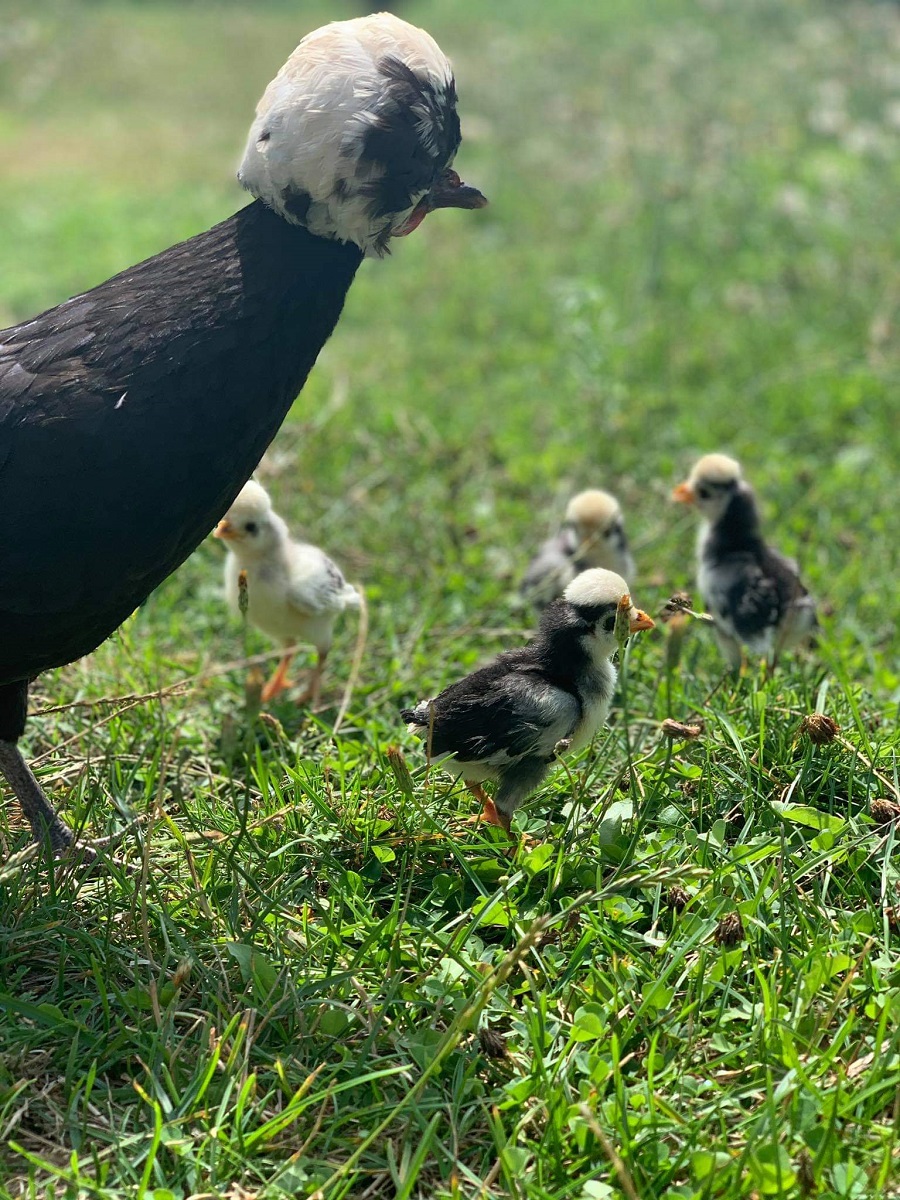
Anshul: What do you grow currently? Did you originally want to grow something exotic or work with the environment you were in? How did you decide what to grow?
Green: Currently, there are over 50 different varieties of vegetables in my garden. Because of my Asian background, I know there are so many varieties of vegetables that I can grow and eat. Year after year, I also started to understand the weather conditions better. When you are growing something the most important thing to look at is the evening’s not the daytime’s temperature. When you are growing something in a flower pot that’s easy – when the evening is too cold, you move the plant inside. Obviously, you can’t do it with a garden.
Growing local food is always wise and you lower the risk of failing because the plant is well adapted to local weather conditions. For instance, I love okra, but it’s originally from India so I tried it the first year and each plant gave me just 2 okras. So the next year I chose to grow another plant with a higher yield. It’s part of learning.
Anshul: What are some examples of fruits and vegetables you are growing today?
Green: I grow a lot because I like to share. Each time I visit my friends I bring 10 kilos of cherry tomatoes. They think that’s way too much, but I probably have another 20 kilos to harvest at home.
I have lots of beans, because they can easily be dried, pickled or fermented. I do have some potatoes, sweet potatoes, artichokes, some Japanese vegetables like mitsuba. This taste is wonderful: you can use it in salads, you can wok it, pickle it, add it into your soup or use it as a garnish – the leaves are very beautiful. Berries: I have raspberries, strawberries, blueberries, wild berries. Apples, cherries, carrots, parsnips, fennel, and tons of Asian greens. Tomatoes of course and a lot of wild flowers, which I use for pictures on my Instagram account. What is really environmentally friendly is that there is no transportation in involved in what I consume. In many organic shops, everything looks organic, is packed in recycled paper bags but people do not see the transportation behind the products and are easily fooled by marketing.
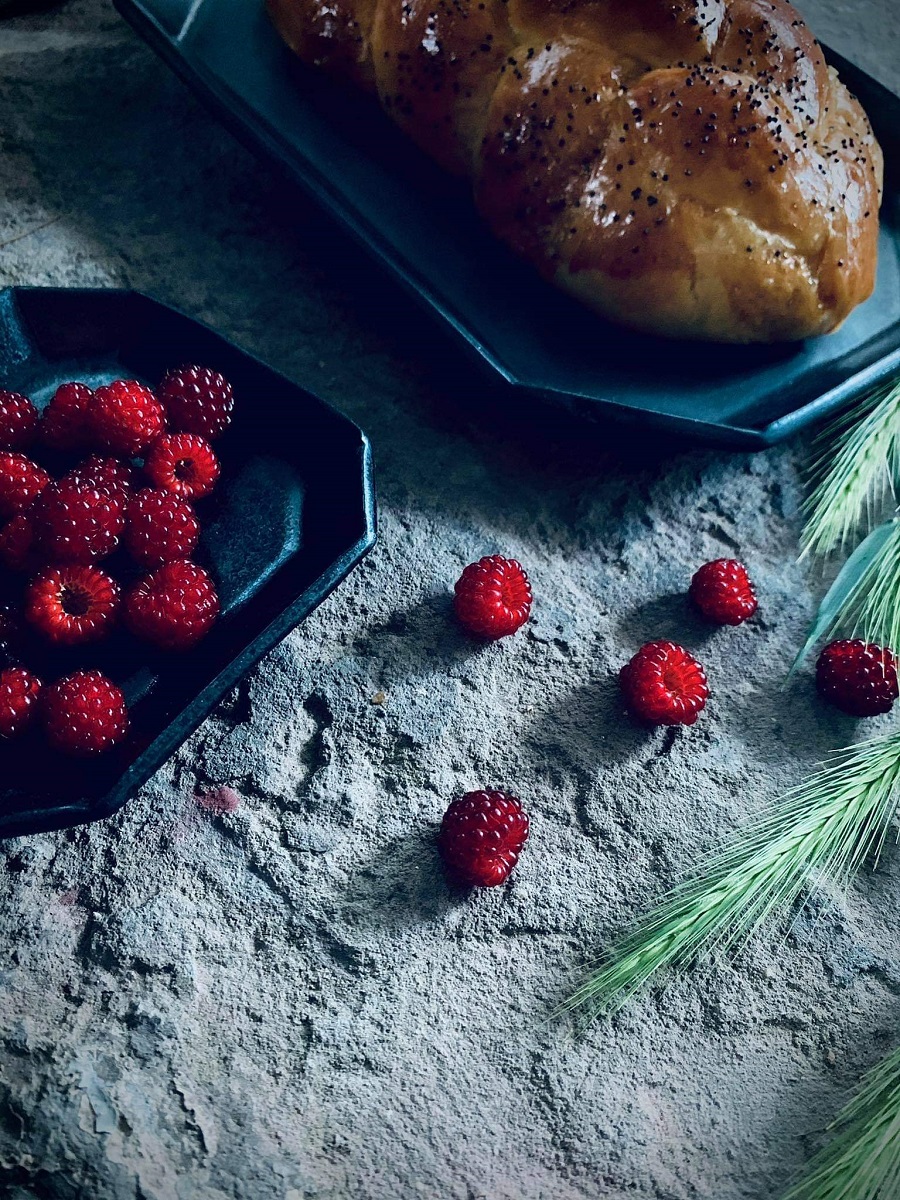
Anshul: That raises an interesting point for people living in regions where the foods they value may not be available. What are your thoughts on balancing cultural identity related to food with what is locally available, since everything cannot grow everywhere?
Green: For me, the most interesting part is to get to the foundation of a flavor. I mentioned mitsuba, which belongs to the mustard family and tastes slightly spicy. It’s all about experiments.
Anshul: All this is making me quite hungry. I haven’t had breakfast yet. Could you now tell us how you balance having an atelier, along with a farm and your other responsibilities. What does time management look like when you have such a diverse garden?
Green: No one ever believes me when I say that I only spend 10-15minutes a day in my garden. There are lots of ways to manage my garden in a very efficient way. For example this year between March-May there was not even a single day of rain. It is sometimes so dry that the government forbids us to water our gardens. So what I do is mulching the soil with hay or straw and water the ground with the rain water I collect.
It’s also important to know how to water your ground. If you spray the water on the plants, you are only wetting the surface of the ground, and when the sun comes up, the water will evaporate. It’s a pure waste of water. Mulching is much better, and, because the material is organic, it will decompose and fertilize your soil at the same time. This prevents water evaporation and weeds from growing. The weeds of course will grow through the mulch but the mulch makes the root system of the weeds shallower so it’s easier to pull them out and you can do it by hands by going into your garden from time to time.
So most of the time spent in the garden will just be for harvesting. I started growing from beginning of April and only watered my garden 5 times in between April and June. I always plant the seeds before the rain comes so if I see on the weather forecast there will be rain tomorrow then today will be my planting day. I will put aside everything else I need to do. I will call my friends and say ‘Sorry, I cannot see you today anymore because I need to tend my garden!’ I also told my friends the best time to look for me is after sunset.
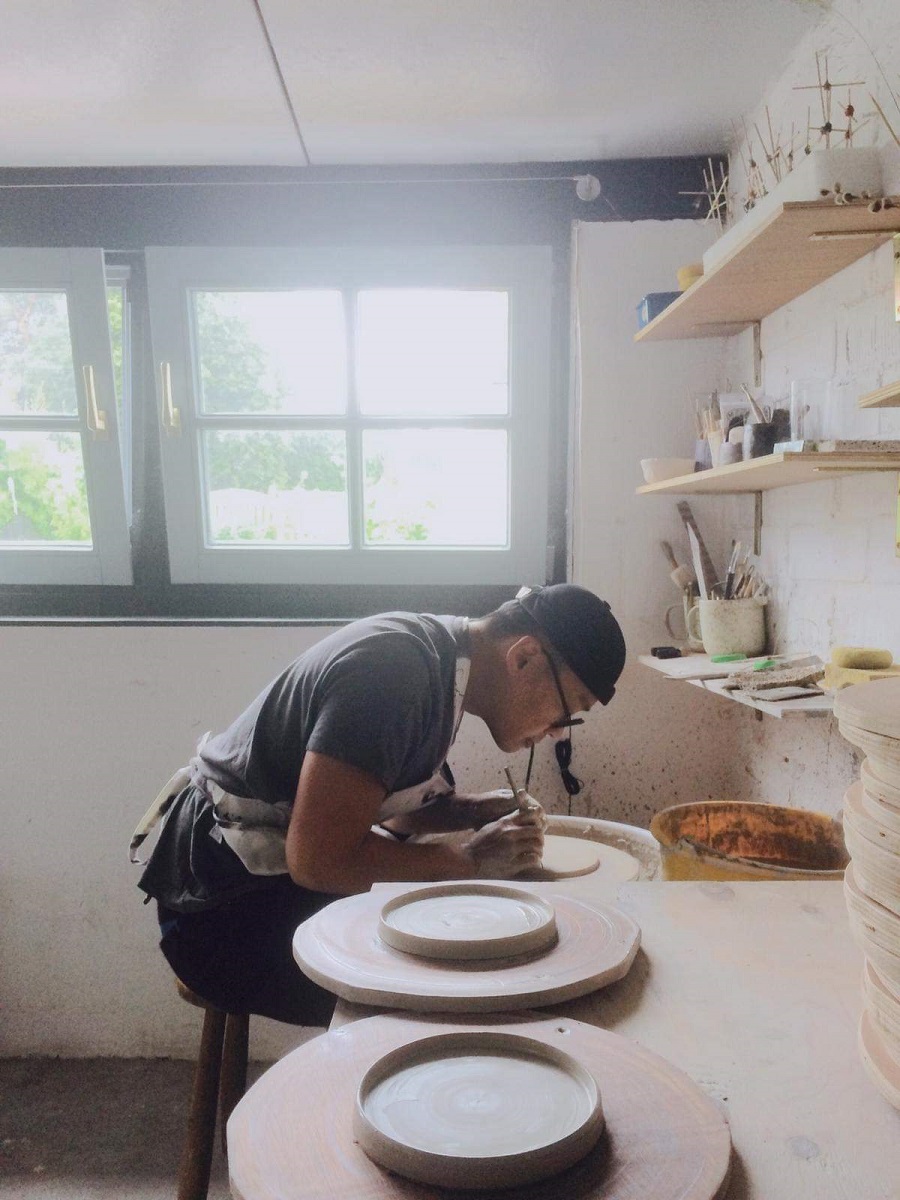
Anshul: I am also curious about how a garden can help save money. Was that a goal when you started or did it evolve over time?
Green: I only go to the grocery store because I’m not a vegetarian. If I were a vegetarian, I probably would not need to go there very often at all, as I would only buy rice and grains. In the beginning, I didn’t focus particularly on saving money. But now, when I am hungry I don’t think about what I should cook. Instead I just go to the garden and look around and say ‘Hmmm, I have this and I have that and I am in the mood for that’. So I start to harvest and think about what I have in my fridge like meat or seafood and how I can combine things.
Anshul: That’s amazing! In the city we most often fall back to delivery services for prepared food and sometimes get too lazy to even go to the grocery store to get ingredients to cook ourselves. So there is a mindset shift to be made here. You grew up in cities so how did you make that shift and what advice would you give people looking to change their views on food?
Green: I would say it all starts from cooking because if you understand the fundamentals of cooking then you can easily replace seasonings, ingredients, etc. I never follow recipes. If there is something I want to make but don’t know how to cook it, usually I will compare 3-5 different recipes to see why and how they make different decisions. And from this kind of exercise you can see what is fundamental and what is a supporting factor in the dish. Like when you are baking: what are the structural ingredients and processes you cannot skip. It’s about understanding the basics of cooking. Then you will be able to be creative. So instead of thinking “What dish am I going to make?”, you are using whatever you have to create a beautiful dish.
Again, it’s all about experimenting. In Chinese medicine we believe we should adapt to nature. In different seasons, we should eat different ingredients and different dishes to keep our body healthy. In the early spring, I go out to the forest to forage whatever ingredients I can find and sometimes, I freeze them or sun dry them to have those ingredients longer. The drying process actually makes the flavors stronger and with fermentation you can eat them year round. But there is always a reason why something grows in a certain season.
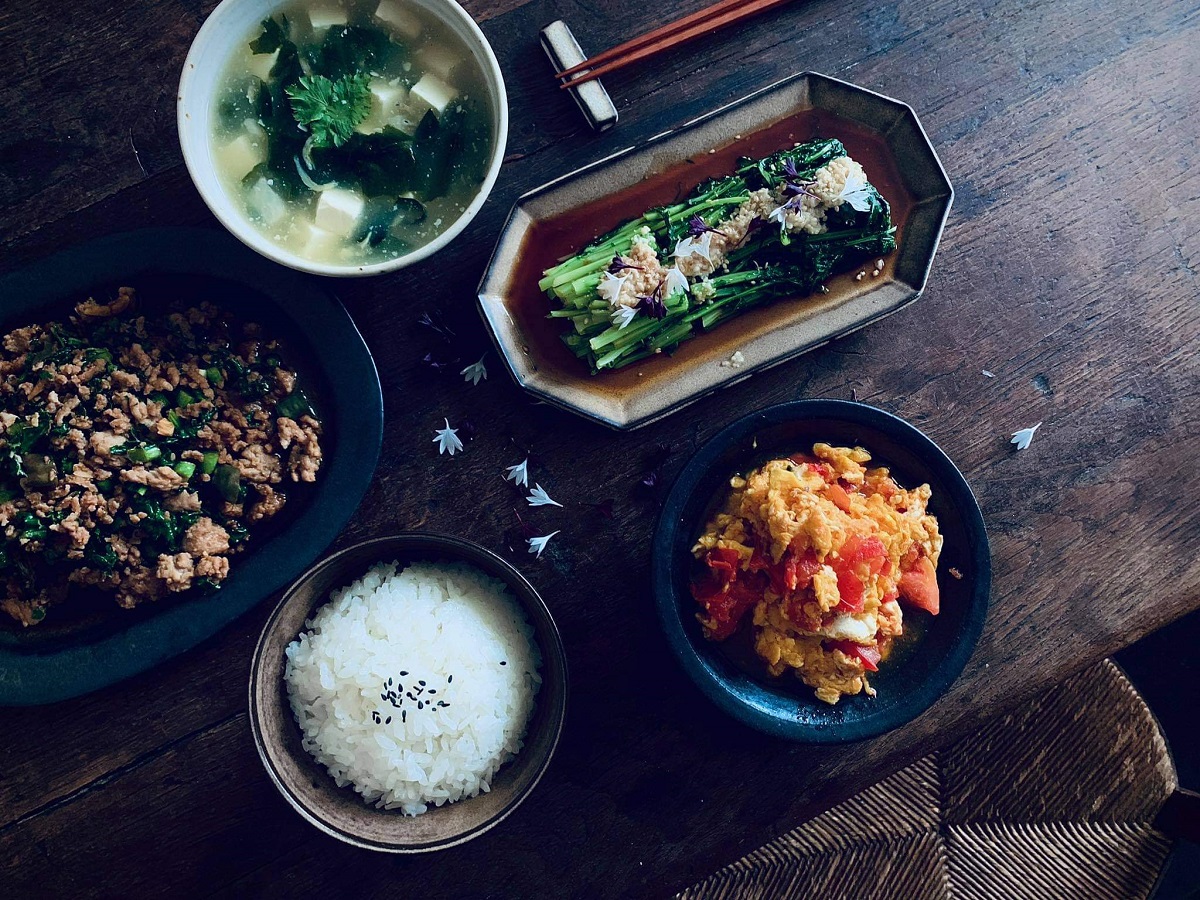
Anshul: How has having this garden changed your physical and mental health?
Green: I moved to this countryside almost 4 years ago and I don’t remember my last visit to a doctor. I think it was 3 years ago so that means starting to eat the produce I grow in the garden, I haven’t been sick yet except once, because of a vegetable from the gourd family. Sometimes when you grow them the taste becomes bitter and it can lead to food poisoning. It was an occasion to learned about that and understand what went wrong in the growing process. So now when I prepare gourds, including pumpkins and zucchini, I take a small slice and if it is bitter I throw it away because it is a warning from nature.
But there are also a lot of benefits. It takes me 2.5 months to fill a 30-litre garbage bag. I throw away garbage 5 times a year and so I produce very little waste because most of the waste goes to compost. My chickens also eat well. For example they eat arugula or rocket. They are too spicy for my taste. My friends love it so I let them harvest it but arugula grows like weed in my garden.
I had never tasted freshly laid eggs. Once I was in a store, I heard chicks chirping and they were selling them so I bought a few and started taking care of them. The process is so therapeutic. They started to grow up and gave me eggs that taste better than the most expensive organic eggs you can buy at Whole Foods. So it was a wonderful process. My chickens are very friendly so when you approach they don’t run away instead they come towards you and sometimes they jump on you too.
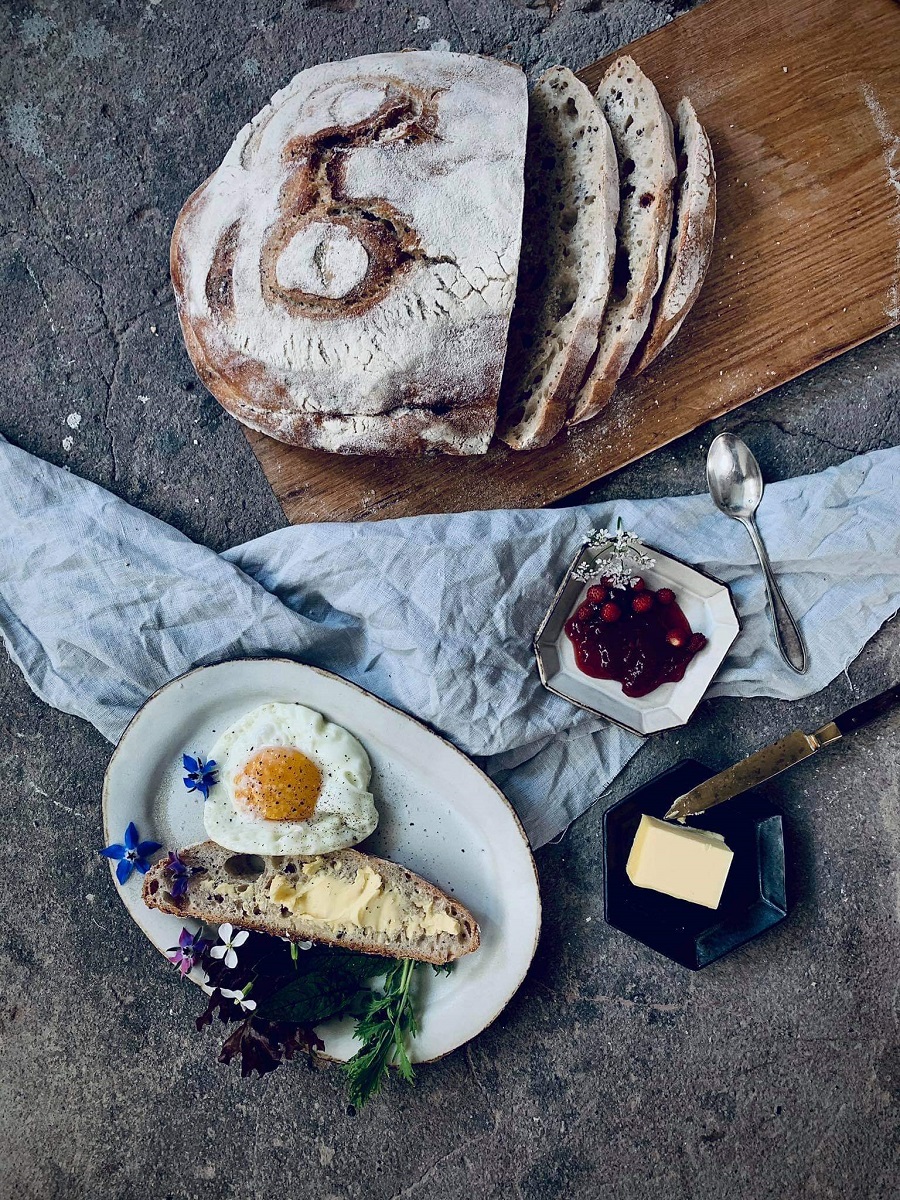
Anshul: How has having this garden affected other parts of your life like creativity, design or other aspects in your life?
Green: What we usually do is that we provide ourselves with more and more options in life. The reason why we go to University, or start a hobby… For example, I immigrated to another country to have more choices, which is such a luxury in life. And later on I figured out that by living in the countryside alone here in peace and quiet, I had a choice: if I want to socialize I can go to the city, and then come back here. But if I live in the city center I don’t have a choice. In the countryside I can choose to not see anyone. I do interact with people but people also create stress.
I always want to inspire people so I want myself to be happy. Of course everyone has emotions. I have my ups and downs but whenever I am in touch with people I want to be positive. The only reason I can be so happy is that when I wake up, I can walk into a field of wild flowers and all I hear is bees, winds blowing on the tree leaves, the chickens – what stress could I have?
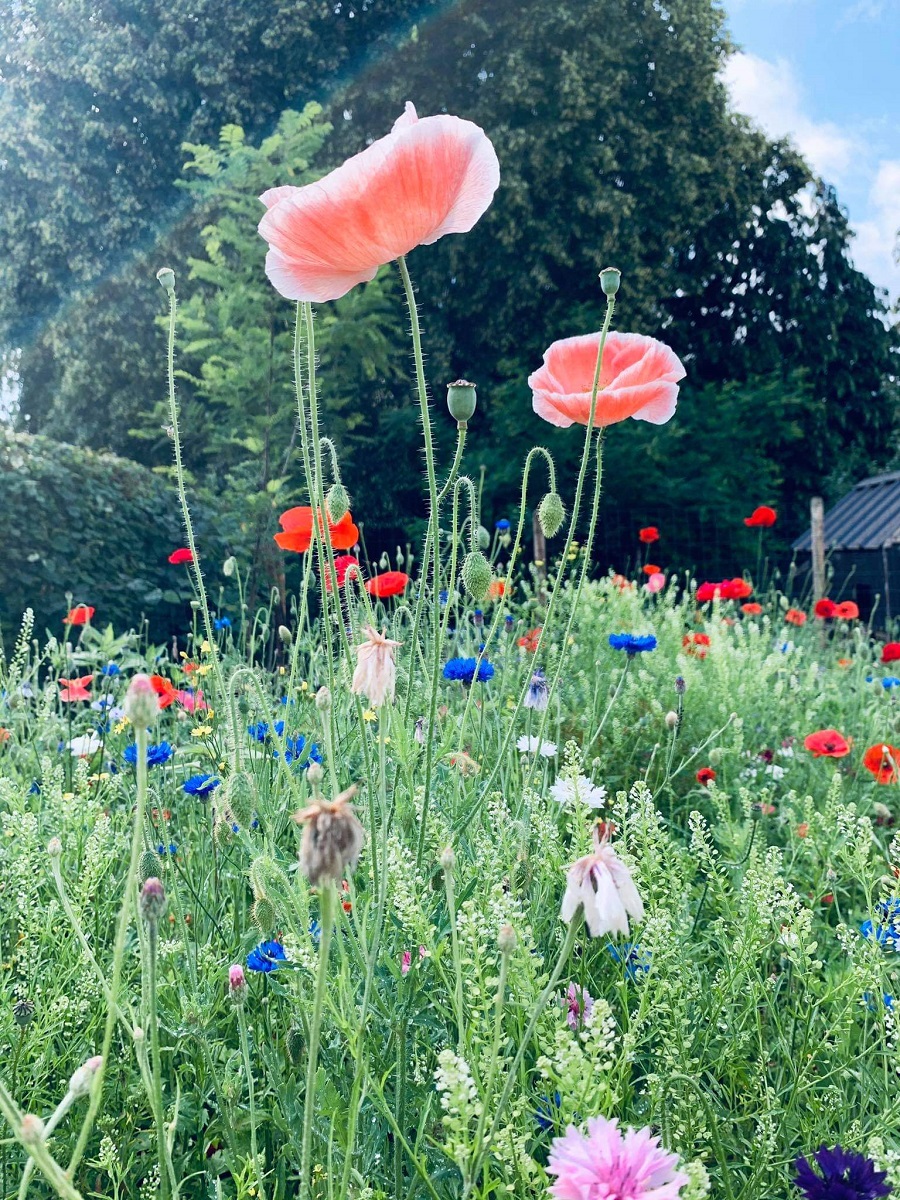
Anshul: In the end, which advice would you would give someone who is starting out on this journey?
Green: Don’t be afraid! Being brave is the key to everything. I know a lot of people who have the most creative ideas. Sometimes, they have developed these ideas for decades but never turn them into actions. And to me that equals zero. So just do it if you have the option. Of course, don’t do it if you only have 20$ left on your bank account, as you would only be giving yourself more pressure. But today, there is so much material that is free, including on YouTube. So many people are sharing their knowledge and their experience. It may not always apply to who you are, where you are or what you grow but through reading, seeing and watching that information, you will start to develop your own knowledge of what you need to do. What you are paying are some tools and seeds. However, three years ago I bought so many carrot seeds that I don’t think I can use all of them in five years. It’s a journey worth trying. You will definitely learn something even though the end result may not be satisfying. At least, you did it.
Also, there is nothing wrong with dreaming big but in the journey from the starting point to the end when you get the result, do set up some small milestones to reward yourself. Through doing this you will get a feeling of satisfaction, and that will be the best encouragement to keep going because I have seen people who dream so big, purchase all this material worth thousands of euros and after one year they stop because they don’t get any satisfaction from it. So do set up milestones, which are also points when you can adjust how you do things, how you plan things. It’s a good method to keep yourself doing it. The most important compliments are the ones that come from within because only you can agree with what you are doing. If you can give compliments to yourself on your own achievement then you will be healthy, happy and confident in what you are doing.
